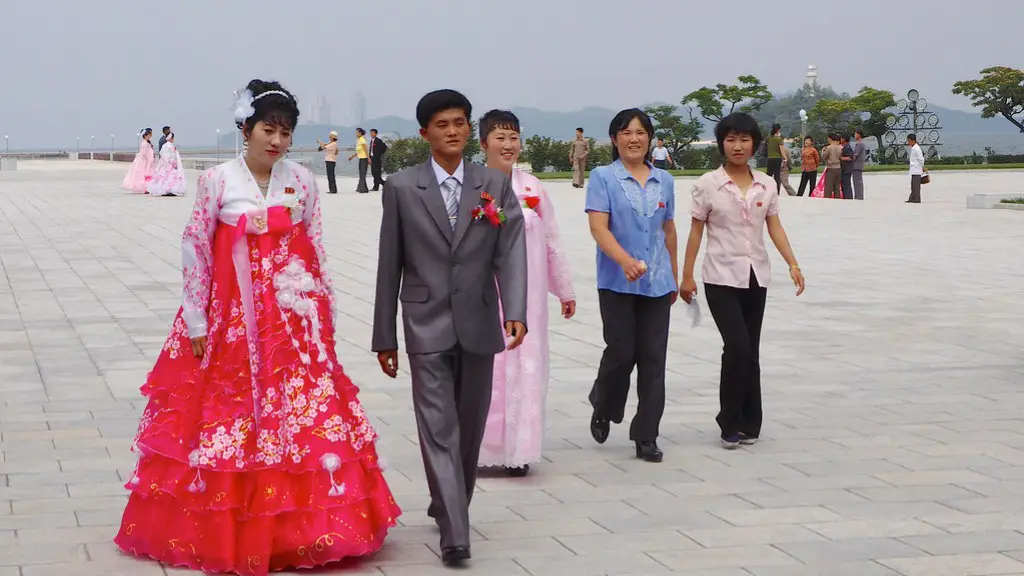Background Information
The Korean Peninsula has been divided since the end of World War II in 1945. The two Koreas were kept separate by the Soviet Union and the United States following the surrender of Japan, which it had occupied during the war.In 1948, the two countries adopted different governments, with North Korea becoming a communist state and South Korea becoming a democratic one.The two countries have remained divided since then and the Korean peninsula has been a site of significant tension and occasional limited armed conflict.
Reasons for Separation
One key reason for the separation of North and South Korea was Cold War politics.The Cold War was a period of intense political and ideological conflict between the Soviet Union and its allies, and the United States and its allies.The Korean peninsula was caught in the middle of this conflict, with the Soviet Union backing North Korea and the United States supporting South Korea.This caused the two countries to become increasingly hostile towards each other, leading to the eventual separation of the peninsula.
Another important factor in the separation of the two Koreas was ideological differences.North Korea had adopted a communist government, while South Korea had adopted a democratic system.This led to significant differences between the two countries in terms of economic, political, and social policies.For example, South Korea embraced capitalism while North Korea followed a more centralized approach to economic growth.
Consequences of Separation
The separation of the two Koreas has had wide-reaching consequences for the region.One significant consequence was the Korean War, which began in 1950 when North Korea invaded the South.The war caused millions of Korean casualties and eventually ended in a truce in 1953.
The separation of North and South Korea has also caused significant economic and cultural differences between the two countries. North Korea is one of the most isolated countries in the world, with limited economic opportunities for its citizens.On the other hand, South Korea has emerged as one of the most economically successful countries in Asia, with a vibrant and innovative culture.
International Relations
The two Koreas have maintained tense but stable diplomatic relations since their separation.Both countries are members of the United Nations, although they do not officially recognize each other as legitimate states.In addition, both Koreas are involved in various regional and international organizations, such as ASEAN, the Asia-Pacific Economic Cooperation, the International Olympic Committee, and the Six-Party Talks, which are focused on denuclearization of the Korean peninsula.
In recent years, there have been a number of attempts at reconciliation between the two Koreas.In 2018, the two countries agreed to work towards a formal end to the Korean War and signed a peace agreement.Both sides have also held summits and other diplomatic talks, aimed at improving their relations.
International Roles
The Korean peninsula has long been a site of international geo-political interest.North Korea possesses an arsenal of nuclear weapons, which has caused significant concern for its neighbours and beyond.South Korea, meanwhile, is a major player in the international space, with its vibrant economy and position as a leader in technological innovation.
Both Koreas possess significant influence in the region as well.South Korea is a member of the United Nations Security Council, suggesting its importance as a global actor.Meanwhile, North Korea maintains strong military links with China and other countries in Asia, providing it with a regional power base.
Negotiation Prospects
Despite the ongoing tension between the two Koreas, there is some hope that a peaceful resolution can still be achieved.While both sides remain distrustful of each other, they have made positive steps towards reconciliation in recent years.
For example, South Korea has offered to help North Korea’s economic development, while North Korea has taken small steps to address human rights structures.These small gestures suggest that the two countries may be able to come together to negotiate a long-term peace deal.
Action Plan
An effective action plan for the reunification of the two Koreas must rely on a mix of diplomatic and economic strategies.On the diplomatic front, both countries must make efforts to build trust and improve communications.This could involve hosting diplomatic talks, engaging in cultural exchange programmes, and working together on regional humanitarian initiatives.
On the economic side, both countries could consider a number of initiatives to facilitate trade and investment. This could involve opening up borders for businesses, granting access to North Korean resources for South Korean companies, and establishing joint economic development initiatives.
Exiting Conflict
An effective exit strategy is necessary for any plan to reunite the two Koreas.It must involve an assessment of the political and security situation in both countries.This would involve looking at the current military status of both Koreas and the potential for other countries to interfere in the peace process.
In addition, an effective exit strategy must also consider the potential for both sides to reach an agreement on nuclear disarmament.The two countries must discuss ways in which North Korea can relinquish its nuclear weapons, while also ensuring that both countries are secure.
Conclusion
The division of the Korean peninsula has been a source of tension in the region for decades.While there remains considerable distrust between the two countries, there is also hope that a peaceful resolution can be reached.This would require a mix of diplomatic and economic measures, as well as an effective exit strategy.Only by implementing these measures can there be lasting peace on the Korean peninsula.


